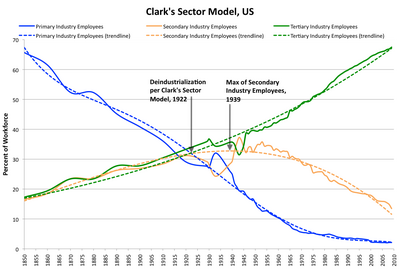
Back Post-industriële samelewing Afrikaans مجتمع ما بعد الصناعي Arabic Postsənaye cəmiyyəti Azerbaijani Постіндустрыяльнае грамадства Byelorussian Постиндустриално общество Bulgarian Societat postindustrial Catalan Postindustriální společnost Czech Postindustrielle Gesellschaft German Postindustria socio Esperanto Sociedad posindustrial Spanish
This article needs additional citations for verification. (February 2023) |

| History of technology |
|---|
In sociology, the post-industrial society is the stage of society's development when the service sector generates more wealth than the manufacturing sector of the economy.
The term was originated by Alain Touraine and is closely related to similar sociological theoretical concepts such as post-Fordism, information society, knowledge economy, post-industrial economy, liquid modernity, and network society. They all can be used in economics or social science disciplines as a general theoretical backdrop in research design.
As the term has been used, a few common themes, including the ones below have begun to emerge.
- The economy undergoes a transition from the production of goods to the provision of services.
- Knowledge becomes a valued form of capital; see Human capital.
- Producing ideas is the main way to grow the economy.
- Through processes of globalization and automation, the value and importance to the economy of blue-collar, unionized work, including manual labor (e.g., assembly-line work) decline, and those of professional workers (e.g., scientists, creative-industry professionals, and IT professionals) grow in value and prevalence.
- Behavioral and information sciences and technologies are developed and implemented (e.g., behavioral economics, information architecture, cybernetics, game theory and information theory).
- ^ "Who Makes It? Clark's Sector Model for US Economy 1850–2009". Retrieved 29 December 2011.